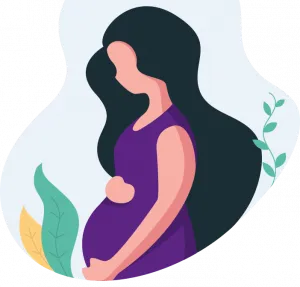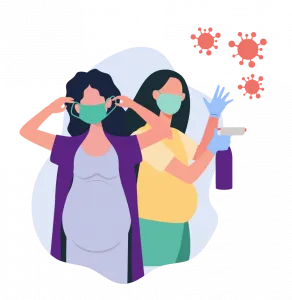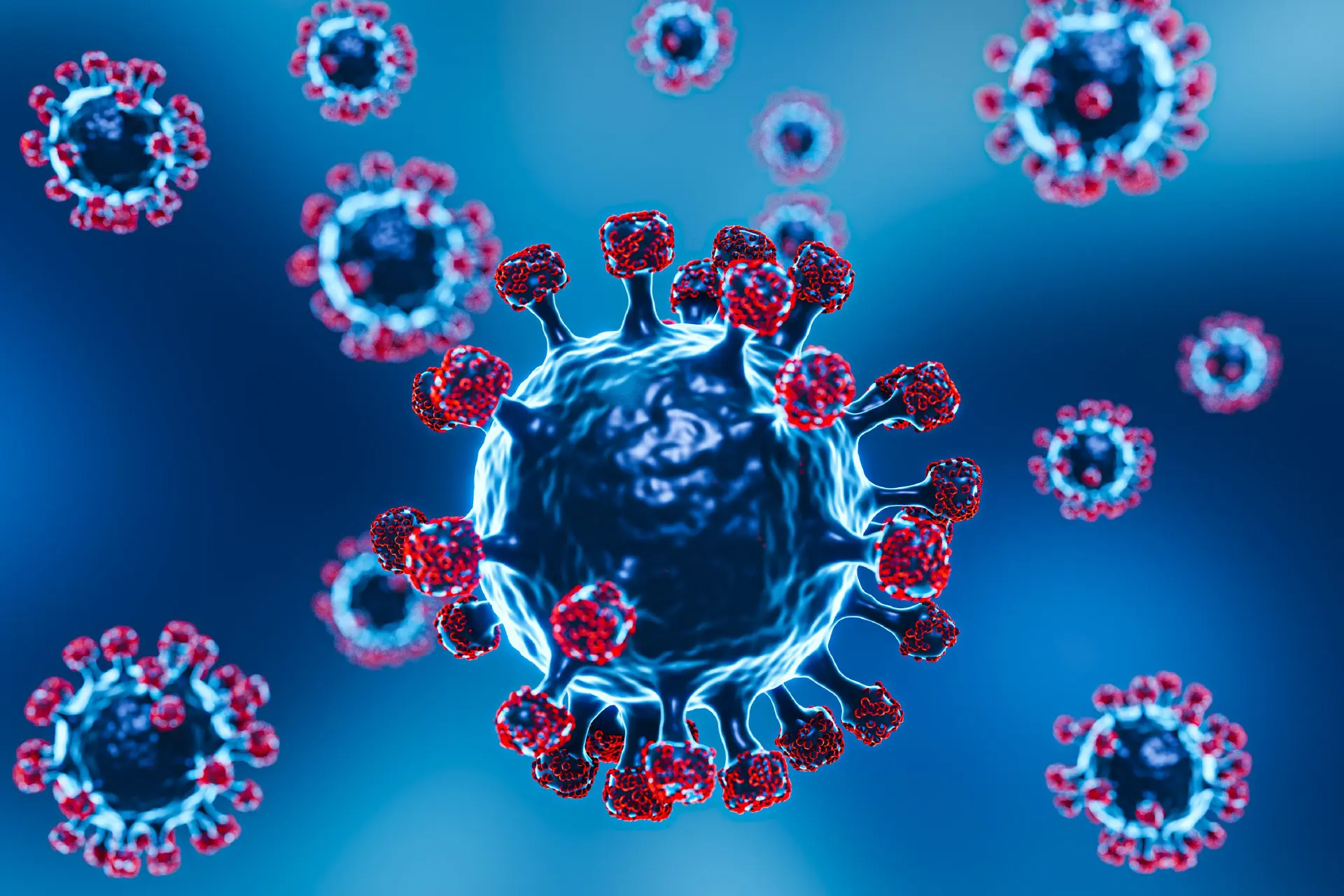Covid | 7 min read
Pregnancy during COVID 19: All you need to know
Medically reviewed by
Table of Content
Key Takeaways
- Covid-19 has raised concerns for all the age groups, but specifically for pregnant women and the health of their baby
- To gain a little more clarity on the risks of COVID-19 infection in pregnant women, take a look at these pointers
- Don’t fret and get stressed; by taking good care of yourself, you can ensure that your baby will be free of any problems
As we all are aware, COVID-19 is a global pandemic caused by the novel coronavirus. It has raised concerns for all the age groups, but specifically for pregnant women and the health of their baby. Pregnant women are immune-compromised, which means they are more susceptible to get infected with viruses. This makes the safety of pregnant ladies very important as they have the full responsibility of their unborn babies also. Although, studies have shown the risk of passing infection from mother to the foetus appears to be very low, and there is no evidence of any foetal malformations or effects due to maternal infection with COVID-19.
The novel coronavirus has given rise to an array of healthcare complications, which are especially tricky for pregnant women. Considering the fact that this virus is new, medical information pertaining to what happens in case of a pregnancy during COVID-19 is still a matter of ongoing research, with very little confirmed data. To add to that, women will also experience normal pregnancy issues such as varicose veins, backache, cramps, and haemorrhoids during this time.
As per a UNICEF report, India is expected to witness an estimated 24.1 million births during 2020. Handling such a large number of births is likely to limit the availability of healthcare services and this may have you worried about the consequences of going through a pregnancy during COVID-19.
To gain a little more clarity on the risks of COVID-19 infection in pregnant women, take a look at these pointers.
Pregnant women have a higher risk of developing respiratory distress
On account of being immunocompromised, pregnant women are at a greater risk of developing illnesses that lead to respiratory distress. Among the more serious symptoms of the COVID-19 virus is difficulty in breathing or shortness of breath, and both require immediate medical care. As per Cynthia DeTata, assistant professor of obstetrics and gynaecology at the Stanford University School of Medicine, “…seasonal flu, and prior SARS and MERS infections were more severe in pregnant women.” While there is a lack of data to confirm the same when it comes to COVID-19, it is imperative for families to prioritise healthcare for expectant mothers during these times to mitigate any risk.
Additional Read: Ultimate Guide for Covid-19Symptomatic COVID-19 cases may be linked to those in the third trimester
As per analysis submitted by the Centre for Disease Control and Prevention (CDC), findings showed that expectant mothers with COVID-19 were more likely to need intensive care and were hospitalised with a ventilator. To add to that, another study conducted in the UK, under the UK Obstetric Surveillance System (UKOSS), found that a significant majority of the women that did become severely ill due to the coronavirus were found to be in their third trimester. Among the symptoms is a high fever, which can lead to birth defects, especially in the early stages of pregnancy. However, there isn’t any evidence yet that suggests that exposure to the virus during pregnancy will amount to defects in development.
COVID-19 pregnancies are at a higher risk of preterm births
As per data from hospitals and healthcare centres in northern Italy, hospitalised pregnant women could be at a higher risk for preterm or premature births and caesarean deliveries. Preterm birth is one that occurs before the 37th week of pregnancy. The preterm delivery rate was 12%, up from 7% in 2019. Similarly, the caesarean delivery rate was also up to 39% from 27% in 2019. While these numbers do not suggest an increase in miscarriages or congenital anomalies for expectant mothers who showed symptoms of the virus, it highlights the increase in preterm births.
Newborns can be infected by the virus and exhibit clinical signs of infection
In a case report analysing 33 pregnant women infected with the virus, findings showed that 3 of the newborns were also infected. These newborns exhibited respiratory distress symptoms, mainly shortness of breath. However, from the same report, other symptoms exhibited by the newborns included lethargy, fever, pneumonia and vomiting. For one of the babies, where the birth occurred after a 31-week gestation window due to fetal distress and maternal COVID-19 pneumonia, resuscitation was required.
Given that this virus is new, research is still being done and there is no finalised data on COVID-19 pregnancy issues. However, there are guidelines to follow that make managing pregnancy during the COVID-19 pandemic a lot easier. To know about these, read on.
Additional Read: Everything to know about COVID-19 carePrecautions to adhere to for a safe pregnancy during COVID-19 pandemic
- Maintain good personal hygiene, especially for your hand and face.
- Follow social distancing norms and stay at home as much as possible.
- Avoid those showing any symptoms of the virus.
- Get vaccinated for the flu to protect yourself against influenza.
- Stay alert to any respiratory symptoms you may begin to exhibit.
- Opt for virtual appointments or consultation via telemedicine. This is the safer route to get the care and medical advice until you absolutely must be present at a hospital.
- Stay away from large gatherings, even those that include family. Pregnant women are immunocompromised and at a greater risk of developing an illness.

Here are some frequent queries of pregnant women, and the general recommendation around it:
- Protect yourself from coronavirus- Regular hand washing and social distancing are of utmost importance for the pregnant women. Especially those who are pregnant for over 28 weeks (third trimester); they should be extra cautious and limit contact with others. Steps towards increasing immunity which is feasible during pregnancy should also be taken.

- Effect of coronavirus on pregnant women- Many viral infections are worse on pregnant women, although studies based on a limited sample have stated that the severity of coronavirus would same on pregnant women as other healthy individuals.
- Chances of the unborn baby to be affected by COVID-19- Currently, there is very little evidence to answer this question due to the limited number of such situations worldwide. Although, the cases mostly demonstrated that the risk of passing the infection to a fetus appears to be very low. Currently, there is no evidence of any fetal malformations or effects due to maternal infection with COVID-19. No evidence suggests an increased risk of miscarriage due to coronavirus either.
- Prenatal visits to hospital/clinics- are important to know the fetal development and mother’s health status. One must consult her gynaecologist/ obstetrician through teleconsultation, if possible. Sonography scans are a necessity, and if your obstetrician feels the requirement of a personal visit, one must take a call accordingly. Use of PPEs is a must during the visit.

- Testing for COVID-19- for pregnant women is the same as the other individuals.
- Staying in the hospital post-delivery- is considered safe for new mothers and the baby. The hospital staff and team take precautions to ensure minimum exposure and risk; hence, visitors may be limited. Your obstetrician team would keep you hospitalized only till it’s required to be.
- Breastfeeding in case the mother is tested positive- There hasn’t been any evidence of spread of the virus through breastmilk. The virus spreads through droplet infection, and hence it would be advisable to pump the milk and let someone not affected feed the baby. Wearing a mask and washing hands before touching bottle parts is necessary.
Don’t fret and get stressed; by taking good care of yourself, you can ensure that your baby will be free of any problems due to coronavirus.
While research on COVID-19 pregnancy issues is ongoing, it is important that you do all you can to avoid getting infected as an expectant mother. This way, you won’t have to look for medical care in a time where healthcare centres are flooded with carriers.
For any doubts, consult a doctor from the comfort of your home on Bajaj Finserv Health. Locate an Obstetrician near you in minutes. View doctors’ years of experience, consulting hours, fees and more before booking an e-consult or in-person appointment. Apart from facilitating appointment booking, Bajaj Finserv Health also offers health plans for your family, medicine reminders, healthcare information and discounts from select hospitals and clinics.
References
- https://timesofindia.indiatimes.com/life-style/parenting/pregnancy/what-to-do-if-you-are-pregnant-during-the-times-of-covid-19/articleshow/75655902.cms
- https://www.whattoexpect.com/news/pregnancy/coronavirus-during-pregnancy/
- https://time.com/5806273/coronavirus-pregnancy/
- https://www.mdedge.com/hematology-oncology/article/223011/coronavirus-updates/covid-19-may-increase-risk-preterm-birth-and
- https://www.whattoexpect.com/news/pregnancy/coronavirus-during-pregnancy/
- https://www.rcog.org.uk/en/guidelines-research-services/guidelines/coronavirus-pregnancy/covid-19-virus-infection-and-pregnancy/#general
- https://www.whattoexpect.com/news/pregnancy/coronavirus-during-pregnancy/
- https://www.narayanahealth.org/blog/covid-19-and-pregnancy-what-are-the-risks/
- https://www.mdedge.com/hematology-oncology/article/223011/coronavirus-updates/covid-19-may-increase-risk-preterm-birth-and
- https://www.health.harvard.edu/blog/pregnant-and-worried-about-the-new-coronavirus-2020031619212
- https://jamanetwork.com/journals/jamapediatrics/fullarticle/2763787
- https://www.nhs.uk/conditions/coronavirus-covid-19/people-at-higher-risk/pregnancy-and-coronavirus/
Disclaimer
Please note that this article is solely meant for informational purposes and Bajaj Finserv Health Limited (“BFHL”) does not shoulder any responsibility of the views/advice/information expressed/given by the writer/reviewer/originator. This article should not be considered as a substitute for any medical advice, diagnosis or treatment. Always consult with your trusted physician/qualified healthcare professional to evaluate your medical condition. The above article has been reviewed by a qualified doctor and BFHL is not responsible for any damages for any information or services provided by any third party.





